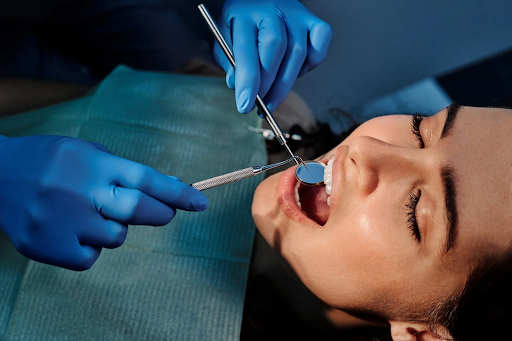It’s no surprise that sleep apnea can wreak havoc on your health. When you’re feeling unrested and lethargic, it’s harder to find the motivation to exercise or eat healthy. While it’s common knowledge that sleep apnea can lead to health problems such as obesity, hypertension, heart disease, stroke, and more, its damaging effects on one’s oral health are often overlooked.
When treating obstructive sleep apnea, the patient should also schedule an appointment with a dentist as well. A dentist with proper training and knowledge about sleep apnea can help diagnose problems with your mouth or jaw that may be causing or worsening your sleep apnea symptoms.
Follow along as ApneaMed explains the connection between obstructive sleep apnea and oral health problems.
The Connection Between Sleep Apnea and Dental Health
Individuals with sleep apnea know just how impactful it can be on their life. Even after a full night’s sleep, the patient wakes up being completely unrested due to the numerous breathing disruptions they experienced throughout the night. While it’s easy to think that sleep apnea only impacts your sleep quality, it can be extremely harmful to the patient’s dental health. Here are a few oral health problems that sleep apnea patients should be mindful of.
Dry Mouth
Sleep apnea causes the individual to experience breathing disruptions when the soft tissues in their throat collapse and cause a blockage of the airway. When this happens, the person often gasps, snores, or chokes in an attempt to reopen their airway. During this process, the individual opens their mouth while trying to breathe, which increases the chance of dry mouth.
Although dry mouth doesn’t seem like it plays a vital role in dental health, it reduces saliva production, promoting bacterial growth. This means that the sleep apnea patient has an increased risk of tooth decay, bad breath, and gum disease.
Bruxism
Bruxism, also known as teeth grinding, is a common occurrence amongst patients with sleep apnea. While the connection is still being researched and examined, it is believed that individuals have an increased chance of grinding their teeth due to them attempting to reopen their airways.
Although minor teeth grinding won’t cause much damage, over time, untreated teeth grinding (and sleep apnea) can lead to more severe and permanent damage to their oral health.
TMD
Similar to teeth grinding, it is also believed that temporomandibular joint disorder (TMD) occurs in sleep apnea patients. Because the individual cannot breathe due to the blockage in their airway, they find themselves choking, snoring, and gasping for air. Along with grinding their teeth, the patient may reposition their jaw in an attempt to reopen the airway. By moving their jaw into an improper position, they may put excess pressure on the jaw’s joint, leading to TMD.
Dental Devices to Treat Sleep Apnea
If a patient’s sleep apnea is caused or worsened by dental issues, a dentist may recommend a treatment option other than continuous positive airway pressure (CPAP) therapy. The most common forms of dental devices used to lower the risk of dental health problems in sleep apnea patients include:
- Mandibular Advancement Devices
- Mouth Guards
- Tongue-Retaining Devices
To determine which sleep apnea treatment is best for your patient’s particular case, they should undergo a sleep study.
Testing and Treatment for Obstructive Sleep Apnea
If you have any signs or symptoms of obstructive sleep apnea, you shouldn’t put off taking a sleep apnea test. Untreated sleep apnea can increase your risk of these health problems, including oral health issues. With ApneaMed’s home sleep test, a board-certified sleep physician will analyze your results, who will determine the correct form of treatment.
If you’re interested in a self-administered sleep apnea test from ApneaMed, contact our team to learn more.

